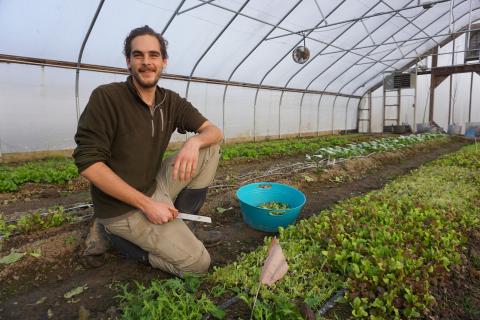
Pete Kane ’18 started managing the Farm to You NH high tunnels and half-acre field adjacent to the Fairchild Dairy in 2016, while he was still an undergrad. With Kane at the helm, the operation provides a unique hands-on food production education for students. All the crops, including lettuce, carrots, kale, cucumbers, tomatoes, sweet peppers, Thai chilis, poblano peppers, tomatillos and cantaloupe, are delivered year-round to UNH’s dining facilities.
Peter Kane: I am the production manager of the Farm to You NH high tunnels. I oversee all day-to-day operations on the farm and deliver everything we grow to the UNH Dining facilities.
I’m also a teaching assistant for the Food Production Field Experience course (SAFS679/680). Students in the class are required to spend three hours a week working at the farm, during which time I help them get some hands on experience and a better understanding of what is needed to manage a farm.
Kane: Coming through the food production course I learned a great deal about farming. The practical work in that course really strengthened my understanding of the concepts taught in other classes in the major. At the end of the course, I approached [course lecturer] Andrew Ogden with the idea of taking over the management position at the farm once the then manager moved on at the end of the semester. Andrew believed in my ability and I took over management of the farm in August 2016.
Having come through the Sustainable Agriculture and Food Systems major, I already knew many of the faculty and professors on campus, which has been greatly helpful over the past few years. Having relationships with researchers and extension agents keeps me connected to the university's best resources on agriculture and has helped me to better manage the farm.
Kane: Five years is a bit difficult to picture right now, as the world is moving so quickly and there are many paths in front of me. I plan to continue as the farm manager here for another couple of years; after that I may decide to continue onto graduate school, or I may want to travel and spend time on other farms around the world and learn about their production systems.
In 10 years, I hope to be settling down and starting my own farm somewhere in New England. I would like to have a homestead and possibly run a small educational center based around agriculture and sustainable living.
Kane: I wish that I knew about just how many opportunities there are for students to get directly involved in the workings of the University. From work study positions on the research farms to lab tech positions with researchers, there are a multitude of ways to get hands on experience in your field of interest while you are here.
Now that I am working at UNH and delivering produce to the kitchens I get to see all of the steps in the food system on campus, and it feels much more connected than it seemed while I was an undergrad.
Kane: The person who influenced me the most at UNH is Andrew Ogden. I took several classes with Andrew before signing up for the Food Production course, and I had always enjoyed his passion for the material he teaches.
What I am most grateful to Andrew for is his willingness to take a chance on hiring me for the farm management position. I was still an undergraduate at the time, and I told Andrew that I would be willing to switch to taking classes part time so that I could also manage the farm. Andrew's trust and guidance have helped me manage the farm confidently and effectively.
Kane: I think that it is important to take some classes outside of one's major to examine concepts through a different lens. The most memorable course that I took at UNH was the women's studies course “Sustainability & Spirituality” taught by Dr. Penelope Morrow.
The course (which is named after a book written by former UNH professor John E. Carroll) focuses on the connections and commonalities of science and spirituality, surveying a wider range of spiritual traditions and seeing how each can offer insights on our current quandary on how to live sustainably. Examining sustainability from a feminist point of view and tying in the threads of spirituality made for a profound experience.
Kane: Get involved. Agriculture is such a diverse field that the best thing you can do is to just get out there and see who you meet and what you find that piques your interest. Use the resources available to you through the university while you can, work with a professor doing research that is of interest to you, or create your own research project and get experience while earning credits. Go out to area farmers markets and talk to farmers in the area, which can often lead you to work opportunities, and it brings you one step closer to your food.
Kane: I miss having unlimited access to the dining halls. Especially now that I grow and deliver produce to them!
Learn more